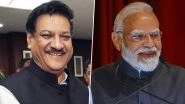New Delhi [India], Feb 20 (ANI): Delhi High Court on Thursday allowed Crime Branch of Delhi Police to question Sanjeev Chawla, who was allegedly involved in a match-fixing racket that was busted by Delhi Police in 2000."Sanjeev Chawla will be kept in Tihar Jail during the entire stage of pre-trial detention and trial and cannot be allowed to be taken out of the Tihar Jail complex for the purpose of investigation or interrogation in police custody," said the court.Justice Anu Malhotra said that Delhi Police can question him in the case inside Tihar Jail till February 28 at 2 am, whereafter, no further interrogation of the petitioner can be granted. The court also said that that the investigating agency may utilise the technology of video conferencing for conducting the investigation and interrogation in the match-fixing case against Sanjeev Chawla.Senior Advocate Vikas Pahwa, appearing for Sanjeev Chawla, told the Delhi High Court that the government has assured UK court during his extradition proceedings, that he will be kept in Tihar Jail while facing trial in India. But the moment Chawla was brought into India, an application was filed, contrary to their assurance to the British govt and police sought Chawla's police custody.Pahwa opposed questioning of Chawla in Tihar Jail saying that government had informed UK court during extradition proceedings that investigation has been completed.In his plea filed through advocate Vineet Malhotra and Hemant Shah, the petitioner has sought to quash of the trial court order dated February 13, whereby the court granted police remand of the Petitioner to the Respondents for 12 days, seeking a direction that the petitioner is directed to be remanded to the custody of Tihar Jail.The petitioner told the High Court that the police custody of the petitioner is wholly illegal and unlawful.Chawla, who was allegedly involved in a match-fixing racket that was busted by Delhi Police in 2000 and extradited to India on February 12, has challenged the custodial remand given by the Patiala House court.Chawla, through his counsel, had challenged the custodial remand on the grounds that it was against the extradition treaty signed between the United Kingdom and India. (ANI)
(The above story is verified and authored by ANI staff, ANI is South Asia's leading multimedia news agency with over 100 bureaus in India, South Asia and across the globe. ANI brings the latest news on Politics and Current Affairs in India & around the World, Sports, Health, Fitness, Entertainment, & News. The views appearing in the above post do not reflect the opinions of LatestLY)













 Quickly
Quickly











